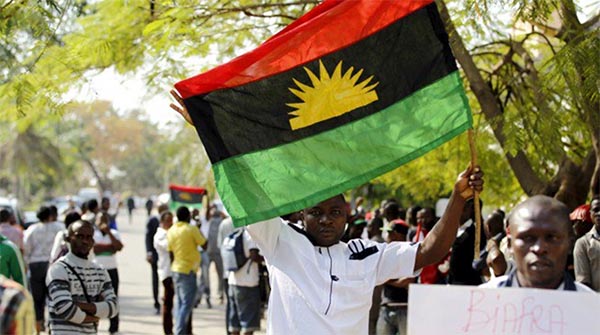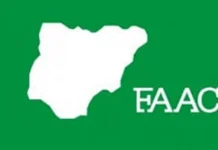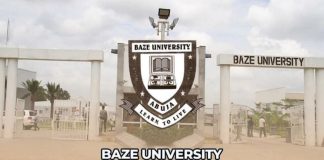Almost half a century after a secessionist war in southeastern Nigeria ended, a renewed push for an independent state known as Biafra is stoking fresh conflict. Thousands of troops have been deployed in the region, which is mainly populated by ethnic Igbos. The forces have rounded up scores of members of the Indigenous People of Biafra, or Ipob, the main group behind the breakaway campaign, several people have died in clashes, and Ipob’s popular leader has gone missing after a military raid at his home.
- What’s brought the Biafra cause alive again?
In short, a new leader. Nnamdi Kanu, 45, has injected new life into the secessionist movement. Previously a member of the Movement for the Actualization of the Sovereign State of Biafra, Kanu quit to form Ipob in 2012. A citizen of both Nigeria and the U.K., he set up the London-based Radio Biafra, which broadcast calls for independence across Nigeria’s southeastern states and hurled insults at the authorities. After years of eluding the authorities, Kanu was arrested in Lagos in 2015 and charged with terrorism and treason. He was released on bail, and his trial is due to resume Oct. 17. If convicted, he could face a death sentence. Kanu hasn’t been seen or heard from since a raid by security forces on his home in the city of Umuahia Sept. 14, his lawyer Ifeanyi Ejiofor said in a Sept. 20 statement.
- What are Ipob’s complaints?
The group argues that the mainly Christian Igbos have suffered discrimination and oppression since the secessionist war ended in 1970. President Muhammadu Buhari, elected in 2015, has fueled that complaint. Buhari has appointed Muslim northerners, like himself, to top military and security posts. Just three of the 17 top officials in positions in the army, navy, air force and other security agencies are from the south, and none are Igbo, one of the country’s three biggest ethnic groups. Buhari has said regions where he won 5 percent of the vote shouldn’t expect to be treated equally with those where he secured 97 percent support.
How have authorities dealt with Ipob?
Buhari’s administration has been accused of sanctioning the security forces’ heavy-handed approach toward unarmed Ipob supporters. That criticism intensified after a video clip circulated on social media purportedly showing the military torturing people bearing the group’s banners and forcing them to swim in muddy water. The military says it’s investigating the incident. Last year, at least 150 of Ipob’s supporters who gathered in the southeastern city of Onitsha in May to mark the anniversary of the war of secession were shot dead, according to Amnesty International.
- What led to the war?
Nigeria’s fractious regional dynamics are rooted in its colonial history. In 1914, Britain merged its mainly Muslim northern protectorate and predominantly Christian southern one into a single nation comprising more than 250 distinct ethnic and language groups. In 1966, mainly ethnic Igbo junior officers staged a coup against a Muslim-dominated government. The administration they installed was toppled six months later and tens of thousands of Igbos were massacred across northern Nigeria. The following year, the southeast region declared independence and the ensuing war claimed between one million and three million lives before the secessionists’ defeat.
- What are Ipob’s methods?
The group is calling for a referendum on independence in the southeast. It insists it doesn’t approve of violence. Nevertheless, a federal high court ordered it banned and designated it a terrorist organization on Sept. 20. Clashes between the authorities and the group’s followers in the course of the raid at Kanu’s residence left several people dead, and a number of Muslim northerners were targeted by mobs in reprisal attacks.
- How much support does Kanu have?
Kanu’s popularity has been boosted by his arrest and his denunciation of Buhari’s government at his court appearances. He has special appeal to unemployed young people in the southeast who feel the pinch of Nigeria’s worst economic slump in a quarter century. Since his April 25 release, Kanu has drawn tens of thousands of followers to rallies, defying a court ban on being in the company of more than 10 people, which has only brought him more admiration.
- Can the secession battle succeed?
One of Buhari’s first actions upon returning to Nigeria in August after undergoing three months of medical treatment in London was to deliver a television address in which he declared that Nigeria’s unity wasn’t negotiable and there would be a crackdown on secessionists. However, his approach is unlikely to quell calls by ethnic minorities for more autonomy and control of their resources, issues that are likely to be central in elections in 2019. Former Vice President Atiku Abubakar, who’s seen as a likely presidential contender, has said he’s in favor of meeting demands for a looser federation of Nigeria’s states. While most regions support greater devolution of powers, not many back an outright breakaway.











